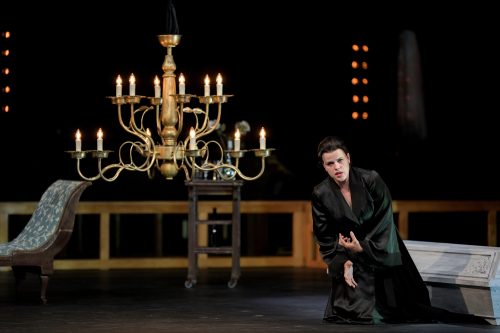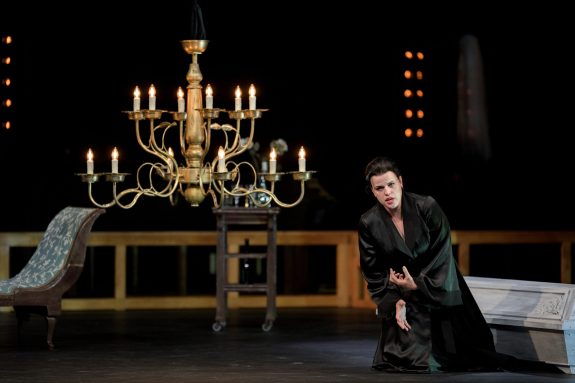 Czech Republic Smetana, The Two Widows (Dvě vdovy): Soloists, Choir and Orchestra of the National Moravian-Silesian Theatre / Marek Šedivý (conductor). Antonín Dvořák Theatre, Ostrava, 6.3.2024. (GT)
Czech Republic Smetana, The Two Widows (Dvě vdovy): Soloists, Choir and Orchestra of the National Moravian-Silesian Theatre / Marek Šedivý (conductor). Antonín Dvořák Theatre, Ostrava, 6.3.2024. (GT)

Production:
Stage director and Set designer – Rocc
Costume designer – Belinda Radulović
Motion cooperation – Anna Knollová
Dramaturg – Juraj Bajús
Chorus master – Jurij Galatenko
Cast:
Karolina – Soňa Godarská
Anežka – Veronika Rovná
Ladislav Podhajský – Martin Šrejma
Mumlal – František Zahradníček
Toník – Václav Čížek
Lidka – Ivana Ambrúsová
Priest – Petr Urbánek
This year 2024 is a Year of Czech Music marking both the 200th birth anniversary and the 140th anniversary of Bedřich Smetana’s death. Uniquely, the only complete survey of the eight operas anywhere in the world are being performed by Ostrava’s National Moravian-Silesian Theatre in a two-part cycle – the first in March, and a second cycle in May. This production of The Two Widows was premiered on 9 June 2022 in a staging by the Slovenian director Rocc. The Two Widows marked a turning point in the composer’s creativity, as the intendant Jiri Nekvasil explains: ‘Smetana crafted a distinctive realm of conversational drawing-room comedy, and in his interpretation, the work transcends its comedic surface, delving into deep psychological, ethical, and social dimensions. Emanuel Züngel adapted the libretto, drawing inspiration from his translation of Félicien Mallefille’s French one-act play of the same name. The librettist skilfully transposed the plot into the Czech environment, introducing Czech names for the main characters while retaining the French lightness, elegance, and wit. The opera premiered on March 27, 1874, at the Provisional Theatre in Prague and was the last opera before Smetana became deaf. Despite this, he continued refining the opera, whose final version is most frequently performed, and premiered in 1878’.
The production’s stage director and set designer, Rocc elaborates: ‘The Two Widows is an opera comedy, but the title is a bit deceptive. They deal with love and the relationship to death, embodying two contradictory principles. The widow Anežka represents the memento mori principle — she remembers her husband and resists moving forward. She strives to forget the past, find joy, and live in a carpe diem style. A peculiar triangle unfolds when a young man, Ladislav, enters the scene. Exploring this dynamic is precisely what we aim to portray because it resonates closely with today’s audience’. The opera encompasses two distinct musical aesthetics. Act I resonates with the charm of operetta or vaudeville. Afterwards, the drawing-room setting transfers to a profoundly psychological narrative. As the opera company’s artistic director and conductor Marek Šedivý acknowledges: ‘Striking the perfect balance of fluency, text clarity, tempo, and sound, tastefully capturing the elegance and depth of the music, poses a challenging yet immensely enjoyable task for me.’
The background to Smetana’s opera is the renaissance of the Czech lands in the mid-nineteenth century when the country planned to celebrate the crowning of the King of Czechia. The libretto, after revision, became a comic opera with spoken dialogues – and in the final 1877 version Czech elements were added, including conversational dialogues in a salon character with music influenced by Chopin and Liszt. The opera mirrors the patriarchal society of Bohemia of the day and opens up the role of women as the leading characters that reflect the composer’s interest in women’s rights, and leitmotifs recur which are both linked with the drama. Each character has its own motif – the opera influenced Richard Strauss’s writing of Der Rosenkavalier, and Mahler was another believer in the opera.
As the vividly colourful harmonies of the overture introduced the leitmotifs of the leading characters, the two widows emerged from the curtain with Karolina brandishing a copy of The Merry Widow in contrast to her morose cousin – dressed in mourning black – Anežka. Each of the ladies occupied the lit theatrical dressing tables on each side of the stage, applying makeup (in Karolina’s case) or writing up her diary (in Anežka’s case). It was instantly clear from the opening bars that the orchestra are a top-class ensemble with rich strings and vibrant brass and woodwinds. As the curtains opened for the first act, the backdrop visuals portrayed swirling wheat crops in a rustic environment. The sparsely ornate stage recreated a drawing room dominated by a couch, two chairs, and a drinks table with a decorative chandelier. The villagers in modern twentieth-century dress sang a joyous chorus, ‘Lovely morning’ inviting their landowner to the Harvest Festival before Karolina entered dramatically in a bright red riding costume contrasting with Anežka’s black.
The contrasting personalities of the two widows were evident in Karolina’s effervescently joyful singing ‘Good Morning my dear cousin’ swigging a bottle of cognac and singing of her affluent lifestyle after the passing of her rich landowning husband in her aria ‘Independently, do I rule over my estate’. She is dutifully attended by her gamekeeper Mumlal (Czech for mumble) who is the victim of many anecdotes throughout and superbly portrayed by František Zahradníček with his subtly expressive bass. At the centre of the opera is the mock trial of the captured ‘poacher’ Ladislav who has loved Anežka for years and sings of his wandering for the incarnated vision of an undine. Charmed by his ballad, Karolina notices Anežka’s embarrassment at seeing Ladislav motivates her to sentence him to no more than half a day’s labour on her farm. Karolina now makes fun of her cousin’s barely masked feelings for Ladislav. An outstanding moment revealing the exquisite vocal powers of the singers was the marvellous quartet, ‘He’s waiting at the door!’ The gamekeeper Mumlal – irritated at Ladislav’s ‘punishment’ – comically protests, yet he is silenced by the joyous chorus, ‘Love is truly the gift of God!’
Before the curtains opened on Act II – from the rear of the stage – Ladislav sings ‘When May Comes’ and sets the tone for the narrative of the opera’s final drama. Karolina suggests to her cousin that she should respond to her secret lover Ladislav, yet embarrassed and still in mourning, Anežka denies any feelings of love while Karolina teases her by saying that she will entice Ladislav Podhajský to marry her: ‘There’s no longer any doubt’. Anežka reads Ladislav’s love poem, and she sings of her happiness with her husband and comically hides the letter when he approaches her. Despite her reluctance to abandon her mourning, Anežka finally falls for Ladislav, yet bashfully sends him away dutifully playing the part of the devoted widow. A comic moment arrives when she sees Karolina dancing with Ladislav: ‘Halt my dear! What do I see?’ Anežka now enters in a white costume, sees Ladislav with her cousin, and becomes jealous – Ladislav confesses his love, and finally, they agree to marry.

The characterisation of Anežka by Veronika Rovná was magnificent in the second act when she transformed from a mourning figure into a woman in love again and the more striking was her deep emotional character against the light-hearted minx of Karolina. Rovná is a magnificent soprano and a great actress, able to reach the highest notes of her role with ease. The Karolina of Slovak mezzo-soprano Soňa Godarská showed she was the finest singer of the evening, and she encapsulated every trait of the coquette and was the most fully rounded of Smetana’s characters in this bright, cheerful opera. Godarská was most impressive in both her glorious coloratura and her acting, in every scene she evinced all the witty aspects of her role, whether mock anger, jealousy or making fun of the errant lovers. She was given the best lines in the first act, while the composer gave Anežka the better music against the lesser music for Karolina in the second act. In their roles, there are parallels with Mozart’s Così fan tutte with Karolina Fiordiligi to Anežka’s Dorabella.
Celebrating the Harvest Festival, the villagers enter the auditorium on both sides and join the two couples of Ladislav and Anežka and the peasant boy Toník and his bride Lidka singing together in a quartet, ‘Ah, what a painful surprise’, and then the celebratory chorus enhanced by a terrifically merry polka dance joyfully surrounding the two happy couples – and before the close – the two widows take their places on stage with the villagers singing ‘Our Lord must surely love us’.
Ladislav Podhajsky was portrayed well by Martin Šrejma, whose glorious tenor embellished the opening to Act II, while the Mumlal of Zahradníček was characterised superbly in his rather droll solemnity mixed with darkly comic mannerisms. The secondary roles of the frivolous lovers Toník and Lidka were well sung and acted too, especially by Václav Čížek’s excellent tenor as Toník. The choreography of both the principal characters and the chorus supported the plot magnificently enhancing the mix of comedy and tragedy with witty charm.
This was a tremendous performance successful in the handling of manifold plots in this narrative of two women crossed by tragedy and of the forceful emerging role of women in Bohemian society. The packed auditorium rose almost as one in applause for this splendid opera by Bedřich Smetana and left one eagerly awaiting the further operas to be staged here in Ostrava.
Gregor Tassie

Typical of modern productions, trash the original concept to make an unrelated point. Compare this one to the 1990s production from Prague and you will see the difference.
It is well conduced and sung, but a total waste of time.